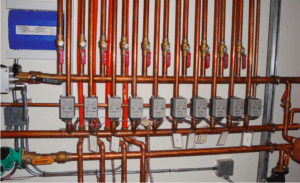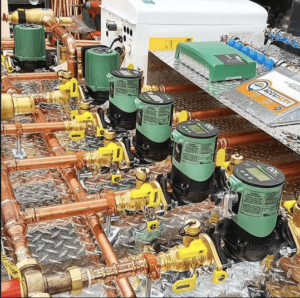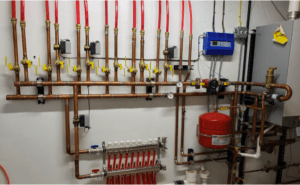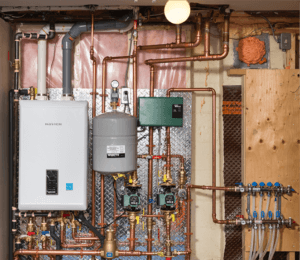Gone are the days where you’re papa stayed up late throwing coal in the furnace so you can remain snugged warm in your blanket. Your systems are automated and effective. Depending on your home, you will have either a furnace or hydronic system. Furnaces are simple, they blow out air into your room, as for the hydronic system; it heats up the water, distributes it through tubes which radiates heat, warming up your home. And since you can create multiple zones to regulate heat individually to each of your rooms, Uncle Bob gets his room warm while Tiny Timmy keeps it cool for his big fort blankets.
If you are reading this article, it’s because you are a smart cookie who already knows a thing or two, and you are trying to make an important decision for your hydronic system. In your search for the best option, Google search has led you here.


Zone valve or zone pumps, which is better suited for your hydronic system?
Between these two zone options, there are passionate debates which one is better for your home, arguments from cost efficiency to energy consumption have all been brought to the table. Before we look at the advantages and disadvantages, let’s first get on the same page.
How exactly do zone valves and zone pumps work?
A hydronic system will either employ zone valves and a singular circulator pump or multiple zone pumps. Both are regulated by the thermostat, both control the flow of heated water coming into your radiators, but here’s where the similarities end.
Zone valves

A zone valve is like a gate that stops the water from passing through. When there is a call for heat from your thermostat the gate opens, and the heated water flows into the radiator tubes, and closes when no more water is needed because the room is heated to your satisfaction.
To go into further detail, when the Thermostat of the zone calls for heat, the zone valve opens up. Once opened, the end switch starts the boiler pump, which will circulate heated water from the boiler to different zones in the home. In short, it warms up our rooms through heated water. Once your rooms reach the temperature set by the thermostat, the zone valves close, and the circulator is deenergized the process repeats itself again when more heat is needed.
Zone pumps

Whereas zone valves use one circulation pump, zone pumps use multiple circulation pumps to heat the water.
Multiple circulator pumps will allow the water to always be hot and none will be wasted because of the constant circulating of a small amount of water through the pipes from the heater to the furthest zone and back to the heater.
Think of a stew on the stovetop. Just as the stovetop keeps the stew cooking at a consistent temperature, the zone pumps keep your rooms at a consistent temperature.
For the smart cookies among us let me put it that way when the thermostat calls for heat; the impeller of the zone pump begins to spin and force water through the system (in this way it functions much like the zone valve’s end switch). Before water can flow through the zone pump, the pressure difference generated, by the pump must overcome the water returning from the circulating pump itself. This keeps a natural regulation of water flow throughout the zones.
Now that we’re on the same page about zone valves and zone pumps. Let’s go over what their advantages and disadvantages are!
Zone valves – Advantages:
- Reliable
- Easy wiring (it´s low voltage wiring) so it is made for easy maintenance.
- Zone valves take up less space. They are generally smaller and only need one circulation pump. Simply put, there’s more wriggle room. This can be helpful if you are living in a smaller home.
- It uses less energy. Zone valves use around 80% less energy compared to the zone valve option (Zone Pumps use 585 Watts, Zone Valves use 185 Watts)
- Zone valve systems are cheap. It’s related to the low voltage. While pumps may cost from $150 to $200, a valve costs around $50 to $60.
Zone valves – Disadvantages:
- Managing the heat is harder compared to zone pumps. If only 1 zone is open, the entire system is still operating as if it is a single circuit. This uses up energy unnecessarily, which becomes a cost sink.
- The life expectancy of valves is shorter than pumps due to excessive head pressure. Water will flow through all valves whether all of them are calling for heat so long as at least one zone is calling for heat. In the same way blowing up a balloon again and again can cause tension, so to this can strain the zone valve.
- It has higher water energy costs
Zone pumps – Advantages:
- Zone pumps are reliable
- Build in redundancy – If You have 5 circulators and one dies you still have 4 circulators, and it still works great. If you have a zone valve system with only 1 circulator and it dies, the system is done.
- Convenience – Who likes to stand around and wait for the hot water to heat up when they are ready to shower? Hot water will be delivered nearly instantly each time a hot water tap is opened. Because the pump keeps the hot water moving throughout the plumbing system, hot water is basically always available. No more waiting time!
- Water usage – less water is wasted. Yes, that means you save money.
- Eco friendly – does it bother you to waste water while waiting for the hot to heat up? If being earth friendly is appealing to you. You will love having a circulation pump.
Zone pumps – Disadvantages
- Cost: More expensive at initial purchase (but in the long run you are saving money)
- It has higher electricity costs – In order to keep the water hot around the clock, older zone pumps constantly used up electricity. This would have been an additional cost sink. The good news is that many of the current models are made with energy conservation systems that maintain hot water rather than reheating everything over again.
Now you know the facts, what side are you on? #TeamZoneValve or #TeamZonePump? There are definitely strong arguments to be had on both sides. But one thing is unanimous; Hydronic heating is king. If you don´t have a hydronic heating system yet, what are you waiting for? It is an energy efficient way to provide clean warm and comfortable heat though your home. If you have never had it before you will be amazed by the smooth heating, you´ll get. There are no more cold or hot spots throughout your home.
If you want to know what works best for your home, do not hesitate to contact us or to call us at (416) 269-2228! The professional assistance of technicians at AccuServ are ready to go to your place and help you decide what’s best for your home.
